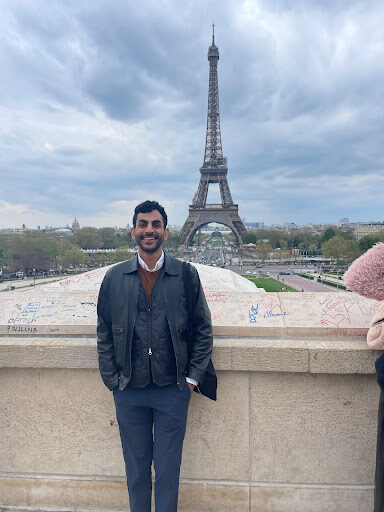It was the type of Parisian street that I loved, wide enough for a car, but really intended for pedestrians. Under the streetlights, the stunning Hausmannian facades seemed to lean gently over the sidewalk. Tonight, though, my eyes were fixed not up at the buildings, but down at the pavement – or what I could see of it. Bags of trash filled the sidewalks and spilled into the street. I picked my way through the narrow path left between them, wary of rats and a little awed. This was a protest.
After three months in Hamburg beginning in September 2022, I was now in Paris to continue research on competition in the healthcare sector at the Paris School of Economics. Over hours in the Crous student cafeteria, meetings with my advisor Professor Milcent, and a lot of coffee, I tried to piece together datasets to understand whether hospitals in France were consolidating as much as anecdotal evidence indicated. And procrastinating on the benches outside, I pieced together Le Monde’s news of the day with my subpar French. President Emmanuel Macron had introduced pension reform legislation that would raise the eligibility age for many workers by two years. In response to these retraite reforms, France mobilized. And so when Sam and Yacine messaged about heading to a manif, I shut my laptop and headed to meet them at Place de la République.

I slammed down some articles on the protests before jumping on the RER B (not delayed!) to my first manif. Solvency, 49.3, CGT — protest vocab and questions swirled before me. Would there be a lot of people? (Yes.) Would I get tear gassed? (Not really.) Would I see protest innovations like the famed hot dog stand on tram tracks? (No but there would be beers out of the back of a truck, pictured.) I walked out of the metro into a crowd tens of thousands strong, not just retirees but folks young and old toting clever signs and protest beers. Far from solemnity, the brisk February morning instead matched the exuberance of the World Cup semi-finals a few months earlier, belief in France’s potential on full display. Energy, joy even, crackled through the crowd as we all marched toward Place de la Nation.
My research marched on through the spring, too, the path forward clearer on some days than on others. I began thinking about consolidation beyond hospitals, and Fulbright’s EU-NATO Seminar pushed me to consider digital markets and emerging challenges in antitrust. Metro strikes gave me plenty of time on the RER B to consider the knock-on effects of consolidation on labor markets. Flights were canceled, and trains, too. I watched commuters dodge police officers on the platform to catch the only train to Lyon that day, before cramming in alongside them for the long haul.
But it was picking my way through those bags of trash, piled as high as mounds of snow after a Pittsburgh storm, that drove the message home. After a pandemic of talking about it, here was work at its most essential. Here, away from the crowds and the hot takes, was a social contract left on the sidewalk week after week for all to see.
Fulbright is the experience you intend and the experience that is intended for you. Studying economics, everyday I walked past a society-wide solidarity that went far beyond it – a humbling reminder of how much can’t be reduced to formulae. And yet, it was also a reminder that sometimes simply to show up is to begin understanding. I’m grateful that I had the opportunity to show up, and for those irreducible reminders that made for an irreducible year.


Shivum Bharill was a 2022-2023 Fulbright-Schuman Student Researcher. He spent the previous several years working in early stage healthcare technology, and researched healthcare antitrust in the European Union. His research focused on the drivers of consolidation in the hospital sector, with a focus on France and Germany, and the role of data assets in mergers and acquisitions. Shivum is a 2017 graduate of Georgetown University.
Articles are written by Fulbright grantees and do not reflect the opinions of the Fulbright Commission, the grantees’ host institutions, or the U.S. Department of State.
